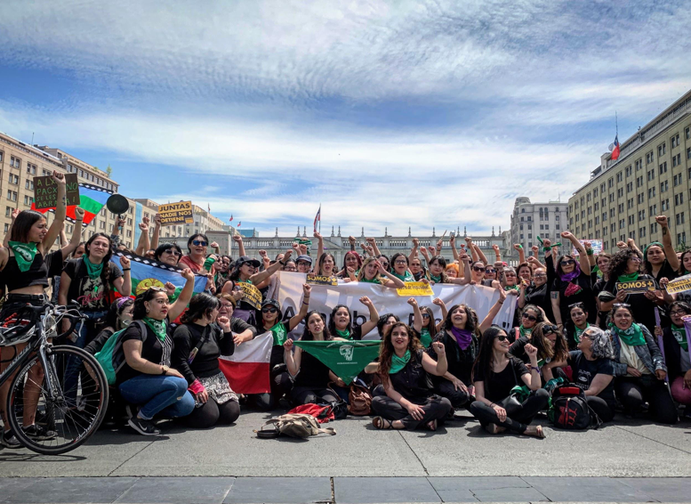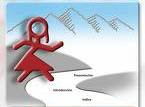Chilean protests and women: One of the historic debts of pseudo democracy
30 years have passed since Chile’s return to democracy, enough time for the remains of one of the most violent dictatorships of mankind to have been overcome and for a conscious reconstruction of the country. However, this has not always been the case. Español

Feminists protest on Friday, October 25 |
Daniela Andrade Zubia
30 years have passed since Chile’s return to democracy, enough time for the remains of one of the most violent dictatorships of mankind to have been overcome and for a conscious reconstruction of the country. It is important to replace the neoliberal legal mechanisms established as part of the 1980 constitution, introduce a just recognition of the past, install fair public institutions and most importantly restore fundamental human rights that were suppressed and privatised, such as: health, education, social security, housing etc. And of course, real inclusion for women with equal access and conditions in all areas of life, with their fight reflected in the slogan “Democracy in the country, at home and in bed”, promoted by Julieta Kirkwood and Margarita Pisano in the 1980s.
But the path chosen in Chile was not this one, and the happiness promised in the 1989 plebiscite never arrived. Instead the pillars of a modern country were built, showcasing itself to the world as the economic miracle, which was achieved at the expense of the emerging middle class’ indebtedness. Those who were promised access to privatised rights and public services that had to be renegotiated with each government elected to office, including the ‘transantiago’ (the public transport system that serves Santiago). That is where the social unrest lead by students on October 18th began, an all or nothing movement, without fear of reprisal over the rise of the subway fares because It’s not 30 pesos, its 30 years! Feminist protests that had been suppressed for many years began to spread through social media.
However, it is also important to recognise that we also adjusted to the system, which although it privatised fundamental rights it also offered market instruments for material acquisition. Access was limited, but possible however, and the system strengthened individualism and unclassed avarice. Consuming more than other generations had been able to, meant you became someone important in a fake economy that was on the edge of collapse and indebtedness; the so-called Latin American neoliberal paradise where individualism triumphed.
It should be noted that all this framed the social unrest. The state of emergency imposed alongside the curfews in different regions of the country reflects a revolution of the fragmented middle class who have put up with the system for all these years and have been paying for it. At the same time, the traditional sexist differences of the domestic environment supported the model and allowed for women to be overworked in their own domestic environment. They work without recognition and without pay. It is the same in the public sphere where women face glass ceilings, wage gaps, punitive taxes at an age when they might have children and reproductive ages. Co-responsibility in households was not encouraged and the social roles within heterosexual relationships remain the same, as evidenced in a report presented by the United Nations Development Program of Chile: A decade of changes towards gender equality in Chile (2009 - 2018).
There is a 30% wage gap between men and women doing the same jobs and have a labour participation rate of only 49.1%
Likewise, the nepotism in the different government administrations and public appointments, since the first administration of President Aylwin in 1990, has resulted in overwhelmingly male cabinet with the exception of the National Women's Service (SERNAM) which implemented gender public policy and, since nothing happens by chance, it orientated the rights of women around the family as an institutional pillar and a culture where women were seen as dependent. Until the current Ministry of Women and Gender Equity which was created by President Michelle Bachelet and who in her last year in office at least managed to pass the 21.030 bill, which decriminalises abortion in three specific circumstances.
On the other hand, the consequences of the sort of the decisions that have been made and the fact that there has been a lack of state honesty, has meant that the state has become a company, where some people benefited from studying the courses offered by the various governments and the grants provided by them to become a ‘specialist’ and ticked the boxes without worrying about whether the outcomes were improving public services or what it cost. The governments lost credibility and became an employment agency of people without any real expertise running departments, while ensuring that friends all got a cut of the cake. Oligarchic rule and patronage in every administration means that today we have a right wing government that doesn’t function, social agencies that work along business lines and a neoliberal left trying to recover based on claims of basic rights that it could have put in place when it was in government.
And what are the consequences for women? Let’s look at the main demands of women today:
However, this reality is still not visible in the social movement that broke out in Chile and from Pinera’s proposed social agenda and just requesting the resignation of his cabinet fails to acknowledge the structural problems within Chile that cause the unfair and inequitable distribution of resources. Alongside the damage being done and the costs of the state of emergency and curfew as a result of a week of the pots and spoons banging in protest (a typical Chilean form of street protest), it goes down in history with deaths, torture, illegal detention and sexual violence.
Consequently, being calm as women in Chile is a privilege we cannot afford. Until there is a participatory process, as was expressed by the Feminist Assembly in the Declaration in the National Library, which rejects violence, demands the demilitarisation of the state and the immediate ending of the state emergency and the application of the State Security Law, we will be there. With the hope of building a country with active citizenship as we saw on 25 October during the march to La Moneda singing ‘the Right to Live in Peace’ by Victor Jara, challenging the police officer blocked the path to protect the Presidential Palace. This was the largest march ever recorded for the dignity of the Chilean people and the strong mobilizations and protests across the country, together with the organization of community councils and to be on the under microscope of the UN High Commissioner on Human Rights. The feminist women of Chile do not want a Chile without us.
There is a 30% wage gap between men and women doing the same jobs and have a labour participation rate of only 49.1%
Likewise, the nepotism in the different government administrations and public appointments, since the first administration of President Aylwin in 1990, has resulted in overwhelmingly male cabinet with the exception of the National Women's Service (SERNAM) which implemented gender public policy and, since nothing happens by chance, it orientated the rights of women around the family as an institutional pillar and a culture where women were seen as dependent. Until the current Ministry of Women and Gender Equity which was created by President Michelle Bachelet and who in her last year in office at least managed to pass the 21.030 bill, which decriminalises abortion in three specific circumstances.
On the other hand, the consequences of the sort of the decisions that have been made and the fact that there has been a lack of state honesty, has meant that the state has become a company, where some people benefited from studying the courses offered by the various governments and the grants provided by them to become a ‘specialist’ and ticked the boxes without worrying about whether the outcomes were improving public services or what it cost. The governments lost credibility and became an employment agency of people without any real expertise running departments, while ensuring that friends all got a cut of the cake. Oligarchic rule and patronage in every administration means that today we have a right wing government that doesn’t function, social agencies that work along business lines and a neoliberal left trying to recover based on claims of basic rights that it could have put in place when it was in government.
And what are the consequences for women? Let’s look at the main demands of women today:
- Beginning with the social crisis over the price of public transport in which students refused to pay for the Santiago metro. This is a big problem for women because there is a 30% wage gap compared to men doing the same jobs and have a labour participation rate of only 49.1
- Following this line of work and the gender-based division of labour and gender stereotypes in access to paid work: according to the latest report by the International Labour Organisation, female labour participation increased from 32.5% in 1990 to 47.4% in 2015. But gender gaps continue to persist in working conditions, access to managerial positions, differences in salaries despite similar training/experience and the female unemployment rate sits at 7.5%.
- Pensions are lower mainly because there are periods of time in which women do not contribute to their pensions because they enter and leave the labour market and work on informal employment.
- Access to public health is precarious, so much so that in Chile, not getting sick is a privilege. If you do, you end up in debt to the privatised system.
- Education remains a privilege. The difference in quality between private and state schools remains clear. In addition, the curriculum is sexist and has not changed.
However, this reality is still not visible in the social movement that broke out in Chile and from Pinera’s proposed social agenda and just requesting the resignation of his cabinet fails to acknowledge the structural problems within Chile that cause the unfair and inequitable distribution of resources. Alongside the damage being done and the costs of the state of emergency and curfew as a result of a week of the pots and spoons banging in protest (a typical Chilean form of street protest), it goes down in history with deaths, torture, illegal detention and sexual violence.
Consequently, being calm as women in Chile is a privilege we cannot afford. Until there is a participatory process, as was expressed by the Feminist Assembly in the Declaration in the National Library, which rejects violence, demands the demilitarisation of the state and the immediate ending of the state emergency and the application of the State Security Law, we will be there. With the hope of building a country with active citizenship as we saw on 25 October during the march to La Moneda singing ‘the Right to Live in Peace’ by Victor Jara, challenging the police officer blocked the path to protect the Presidential Palace. This was the largest march ever recorded for the dignity of the Chilean people and the strong mobilizations and protests across the country, together with the organization of community councils and to be on the under microscope of the UN High Commissioner on Human Rights. The feminist women of Chile do not want a Chile without us.
Fuente: Open Democracy


















